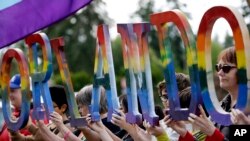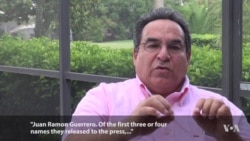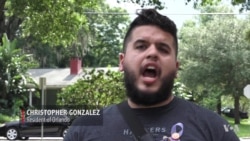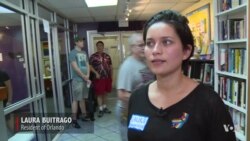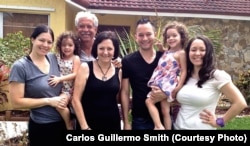Seated in his home, dressed neatly in a pink button-down, Dominican-native Juan Guerrero relives the horror he felt upon seeing the list — that is, of the 49 victims that did not survive Sunday’s mass shooting at Pulse nightclub.
“Juan. Ramon. Guerrero.” His hands spell out the name.
“Of the first three or four names they released to the press, there was the name of my son.” He doubles over, attempting to catch his breath.
As he weeps, he massages his heart. “I lost part of my life," he says.
The Guerreros are one of many families that lost a son or a daughter that evening.
WATCH: Father remembers seeing his sons name on list of victims
His son was a 22-year-old graduate of the University of Central Florida, "a great son, hard working, sweet," and deeply in love with his boyfriend, Christopher Leinonen, who was also gunned down that night.
Like Juan Guerrero, many of the victims’ families are coming to terms with the fact that a gay nightclub, on a Latin night, was the shooter’s choice of target. For much of the LatinX community of Orlando, that means a new reality – the places they once thought were safe are not.
Finding a safe place
Christopher Gonzalez, a resident of Orlando and member of the millennial LatinX community, recalls watching the news with his dad, before his dad turned to him to offer some fatherly advice: "Chris, you have to be careful.”
The problem is that being careful doesn’t always work, Gonzalez said.
“There were people that were keeping in contact with family members up until the very last moment before they were killed. They were being careful,” he said. “They were letting their families know where they were, so it doesn’t matter how careful you are anymore.”
Gonzalez said Orlando has a very tight LGBT Latin community.
Pulse, the first gay bar Gonzalez said he ever went to, was among a few establishments where he describes feeling truly safe and welcome, a place he called “home.” Now, he said, he is frightened to go out.
“I’m scared,” he said. "I’m scared as a bartender, especially a bartender in the LGBT community. You can’t help but think that you could potentially be the next target."
WATCH: Christopher Gonzalez, a member of the millennial LatinX community
Carlos Guillermo Smith, a LatinX resident of Orlando, is a first-generation Peruvian-American and a candidate for Florida state House district 49, a liberal area in east Orange County, a 10- to 15-minute car ride from Pulse.
Politics aside, his life, too, has been impacted by Sunday morning’s tragedy.
“It really struck me at my core,” Smith said. “It disproportionately impacted young Latino gay men, which is who I am.”
Smith, like his friends, used to go to Pulse all the time.
“It’s a great place that we go to let our hair down, and to listen to Beyonce and enjoy a cocktail, enjoy each other’s company," he said.
Smith didn’t go out Saturday night, but a friend of his did, and happened to return home 10 minutes before the shooter arrived at the club. Although Smith's friend survived, four of the friends he was with did not.
Extra precautions
Smith said it’s a reminder of the challenges the community faces on a regular basis, even in a town like Orlando, which he describes as progressive.
“It’s who we are, that’s just a reality,” he said. "We always have had to take care of ourselves and make sure to be safe when we go out and make sure that we don’t walk down dark alleys by ourselves. There’s just a level of understanding of additional things that we need to do.”
As forward-thinking as Orlando might be, according to Smith, Latino families there – like everywhere in the country – have had to reconcile often deeply rooted faiths in Catholicism and other denominations with accepting a family member that is gay.
He thinks that if there is anything positive that can happen in the wake of Sunday's tragedy, it’s a conversation between LGBT and faith communities.
“It has been long overdue,” said Smith.
Stronger than fear
The LatinoX community of Orlando faces a long path to recovery. But residents like Gonzalez, who remains scared to enter a bar today, said it won’t keep him away forever.
“We can’t constantly live in fear,” Gonzalez said. “As fearful as people are to go out anywhere right now, you kind of have to push that aside.”
He pauses to reflect on the moment.
“My community needs me right now,” said Gonzalez. “My community needs us to come together."




